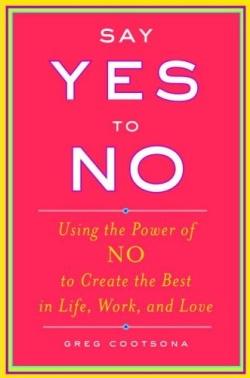Though no is a short word, many people in ministry find it difficult to say. Saying no is an important aspect of dealing with stress and preventing burnout, as we see from this conversation with Greg Cootsona, author of Say Yes to No (Doubleday).
YouthWorker Journal: What do you mean by “the power of no”?
Greg Cootsona: When we state strategic nos, we create space for our yeses. When we say the right nos, our yeses can take hold and flourish.
YWJ: What personal experiences have contributed to your belief in the power of no?
Greg: While living in Manhattan, serving as pastor and raising two young daughters, God caught my attention. I had said yes to too many good things. My heart was demonstrating signs of stress, and my doctor began to express concerns. At age 38, I found myself taking a stress test to determine whether the pains in my chest were actually something more serious. Thankfully, my heart was good; it was just some mild high blood pressure going haywire. Nevertheless, I realized my health was getting worse due to the pressures of my personal goals, my family’s needs and my ministry obligations. I couldn’t just take on a better attitude. I had to say no.
YWJ: How might the “power of no” impact a person’s relationships?
Greg: Two key areas in which the “power of no” benefits relationships are intentionality and boundaries. When we say no to pursuing every relationship, we learn to focus intentionally on a few key friends God has given us in order to invest more deeply. For those in church ministry, this is critical for building the leaders God has given us. Youth workers and parents need to set boundaries, as well. In that way, we help our children and youth grow by demonstrating constraints.
YWJ: You link the “power of no” with the freedom of forgiveness. Why?
Greg: Forgiveness takes away the present power of a past wrong. When we forgive, we say no to bringing a past hurt or wrong continually into the present. We take away its power. There ultimately can be no freedom in the present unless we say no to holding grudges and pain from the past.
YWJ: How can someone learn to say yes to no?
Greg: By practicing no. Saying no is hard—we don’t want to cut off all the alluring possibilities that dance around us daily; and we don’t want to become negative people. So we need conviction (that is, to know why we say it) and humanity (we realize it may disappoint others, but it’s for a more important yes). For those in church ministry, practice no by taking a day off. God actually commands us to trust Him for a day. We can’t tell our people—whether youth or congregations—to find joy and peace in the Lord while we run around like scared rabbits. The demands never will be done, and God calls us to refresh and renew at least once a week.




